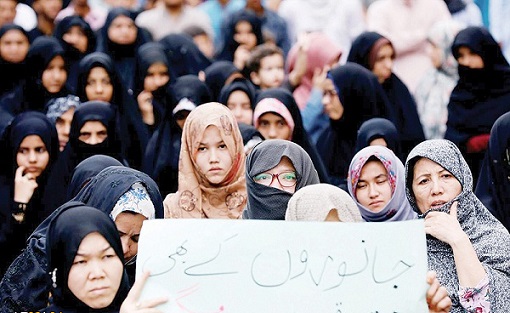A country carved out of racial hatred, religious animosity, violence and savagery has only that to offer to its people. In the pandemic times of Covid 19, while the humanity is battling together the terrible calamity, Pakistan is the only country where they have discovered a sectarian scapegoat responsible for the pestilence.
Hazara, a religious ethnic Shia minority originally belonging to the central Highlands of Afghanistan, have a history of being persecuted since the times of Babur. They migrated to Baluchistan and Iran over the centuries.
While those who opted for Iran secured a safe haven, those who trekked for British India could not foresee the troubles which future held in its womb.
After the creation of a Sunni Pakistan, all other minorities faced discrimination, land grabbing, social discrimination and persecution. The oppressors were from Pakistani government to militant groups to the general Sunni mindset of radicalised public.
But this pandemic has now drawn a new tangent altogether.
The Hazaras returning from pilgrimages in Iran are targeted for being carriers of the pandemic. From referring to the virus as “the Shia virus”, Pakistan’s Hazara Shias were the first victims to be directly discriminated against and targeted by the officials. On March 12, the Inspector General (IG) of police in Balochistan, came out with a notification where he ordered people belonging to the Hazara community on leave.
On March 13, the Water and Sanitation Authority (WASA), a public department, issued a notification on similar lines in which Hazaras living in Marriabad and Hazara Town, in Quetta, two majority areas for the Shia-majority ethnic group, were categorically asked to stay in their areas.
On March 25, the chief secretary of Balochistan, the highest executive position in the province, announced during a press conference that Hazara areas will be secluded from the rest of Quetta city, province’s capital. The reasoning was that Shia-majority Iran was a hotspot for COVID-19 at that time, therefore Shia-majority Hazaras must be quarantined.
Other examples of discrimination witnessed were in public institutions like the Civil Hospital and the State Bank of Pakistan, employees belonging to the Hazara community were unofficially asked not to come to the office.
Shias count approximately 10–15 per cent of the Muslim population of Pakistan. And Hazaras are a minority within this minority.
Shia are regarded as apostates by some extremist Sunni groups and individuals. As a result, hostility is faced by them from extremists and public calls for members to be killed.
The sizeable Hazara population in Quetta remain a targeted community due to their ethnicity as well as their religious beliefs.
Pakistan have an estimated population ranging from 650,000 to 900,000 of Hazara of which 500,000, live in the city of Quetta, the provincial capital of Balochistan.
The history of religious discrimination in Pakistan is as old as the creation of Pakistan. Not only Hazaras are discriminated against, the Christians are given aid only after they recite kalima in penance. Similarly, Hindus in Lyari in Karachi are denied aid after they reveal their national identity cards.
Sadiqa Sultan, a research/development consultant in Islamabad and columnist in “The Express Tribune” alleged that Hazara Shia pilgrims returning home to Pakistan after travelling to Iran were quarantined beyond the recommended 14 days for Covid-19, in poor conditions and with little access to information or medical assistance.
“They were quarantined in a tented camp at Taftan on the border at first, then at Mia Ghundi (outskirts of Quetta), and finally at either Haji Camp or Sheikh Zayed Hospital, both in Quetta itself. Initially there were non-Hazara pilgrims as well with us at Taftan. [But] they were sent home soon after. Other non-Shias were not stopped at all for screening or testing for Covid-19 and were let go” she said quoting an unnamed Hazara woman, aged 45.
She alleged, “misinformation and uncertainty resulted in panic and emotional fatigue and women were sceptical of the testing procedures. For instance, a mother who breastfed her child tested positive while the child was negative. She did not trust the result, as she did not know that similar results have appeared elsewhere. The cleaning staff would check our body temperature – there were no doctors and nurses available”.
She fears that with the advent of holy month of Moharram, Ashura processions, which are so important for the Shias, the Hazaras might not be allowed to take it out.


